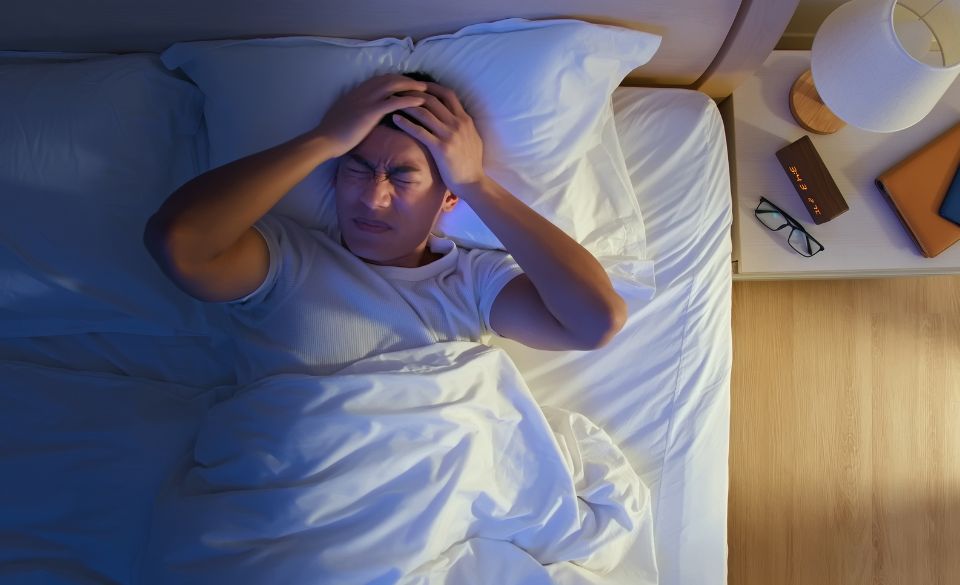
Runner’s Insomnia: When Sleep Eludes the Avid Athlete
Page Contents
- The Running-Sleep Connection: Understanding the Paradox
- Stress and Performance Anxiety: Breaking the Sleep Cycle
- Late-Night Fueling: The Impact of Eating Before Bed
- Establishing a Sleep-Friendly Routine: Tips for Sound Sleep
- Managing Pre-Race Jitters: Taming the Anxiety Beast
- The Power of Napping: Recharging During the Day
- Sleep Hygiene and Sleep Environment: Creating the Perfect Sleep Oasis
- Seek Professional Help if Needed: When Insomnia Persists
As a dedicated runner, you know that getting a good night’s sleep is essential for optimal performance and recovery. However, there are times when sleep seems to be playing hard to get, leaving you tossing and turning in bed. If you find yourself counting miles instead of sheep at night, you might be experiencing a phenomenon known as “runner’s insomnia.” In this blog post, we’ll explore the relationship between running and sleep, the factors that contribute to insomnia, and practical tips to help you finally catch those elusive Zzzs.
The Running-Sleep Connection: Understanding the Paradox
It may seem ironic that a sport known for its exhausting nature can sometimes lead to sleep disturbances, but the relationship between running and sleep is more complex than it appears. Regular exercise, including running, has been associated with improved sleep quality and duration. Physical activity can help reduce stress and anxiety, which are common factors contributing to sleep problems.
However, the timing and intensity of your runs can play a significant role in sleep disruption. A study published in the Journal of Sports Science & Medicine found that vigorous evening exercise can delay the release of melatonin, the hormone responsible for regulating sleep-wake cycles. This delay can make it harder to fall asleep and might explain why some runners experience insomnia after intense evening workouts.
Stress and Performance Anxiety: Breaking the Sleep Cycle
As a passionate runner, you likely set high standards for yourself and strive to achieve personal bests. While this drive can be motivating, it can also lead to stress and performance anxiety, which are common culprits behind runner’s insomnia. Pre-race jitters, worries about training progress, or simply the pressure to perform well can keep your mind racing when it should be winding down for sleep.
A study in the Journal of Clinical Sleep Medicine highlighted that athletes, including runners, often experience higher levels of stress and anxiety due to the demands of their sport. This stress can manifest in disrupted sleep patterns, making it challenging to get the rest you need to excel in your training and racing.
Late-Night Fueling: The Impact of Eating Before Bed
As a runner, you know the importance of proper nutrition to fuel your workouts and aid recovery. However, late-night snacking or eating a large meal close to bedtime can have a negative impact on your sleep quality. Digesting a heavy meal requires energy, which can interfere with your body’s ability to wind down and prepare for sleep.
Studies have shown that consuming high-fat or high-protein meals close to bedtime can lead to increased wakefulness during the night. Additionally, spicy or acidic foods can cause indigestion and disrupt sleep. It’s best to avoid heavy or stimulating foods at least two to three hours before bedtime, opting for light and easily digestible snacks if needed.
Establishing a Sleep-Friendly Routine: Tips for Sound Sleep
The good news is that there are practical steps you can take to improve your sleep and banish runner’s insomnia. Creating a sleep-friendly routine can work wonders in helping you fall asleep faster and enjoy more restorative sleep.
Stick to a Schedule: Try to go to bed and wake up at the same time every day, even on weekends. This helps regulate your body’s internal clock and improves sleep consistency.
Wind Down Gradually: An hour or so before bedtime, engage in relaxing activities like reading, taking a warm bath, or practicing deep breathing exercises to signal to your body that it’s time to unwind.
Limit Screen Time: Avoid using electronic devices, such as smartphones or laptops, at least an hour before bedtime. The blue light emitted by these devices can interfere with melatonin production and disrupt sleep.
Create a Comfortable Sleep Environment: Keep your bedroom cool, dark, and quiet to promote better sleep. Invest in a comfortable mattress and pillows to enhance sleep quality.
Managing Pre-Race Jitters: Taming the Anxiety Beast
Pre-race anxiety is a natural response to the anticipation and excitement of competition, but it can also wreak havoc on your sleep. If you find yourself lying awake the night before a race, anxiously going over race strategies or worrying about performance, know that you’re not alone. Many runners experience pre-race jitters, and it’s essential to manage this anxiety to ensure a good night’s sleep.
One effective strategy is to establish a pre-race routine that includes relaxation techniques. Practicing mindfulness, meditation, or gentle yoga before bedtime can help calm your mind and ease anxiety. Remind yourself that pre-race nerves are a sign of your dedication and passion for running. Embrace the excitement and channel it into positive energy that will fuel your performance.
The Power of Napping: Recharging During the Day
If you’re struggling with sleep at night, don’t underestimate the power of a well-timed nap during the day. Short naps, around 20-30 minutes, can improve alertness, mood, and cognitive function without interfering with nighttime sleep.
Research in the Journal of Sports Sciences has shown that strategic napping can be especially beneficial for athletes to compensate for sleep deficits and improve physical and mental performance. If you have the opportunity, consider incorporating a brief nap into your day, especially after intense training sessions.
Sleep Hygiene and Sleep Environment: Creating the Perfect Sleep Oasis
Improving your sleep hygiene and creating a conducive sleep environment are crucial steps in overcoming runner’s insomnia. Sleep hygiene refers to the habits and practices that promote good sleep, while a sleep-friendly environment supports relaxation and restorative sleep.
Apart from winding down before bedtime and limiting screen time, consider making your bedroom a sleep oasis. Invest in blackout curtains to block out light, use white noise machines or earplugs to mask disturbances, and keep the room at a comfortable temperature. Creating a peaceful and clutter-free space can contribute to better sleep quality.
Seek Professional Help if Needed: When Insomnia Persists
If you’ve tried various strategies to improve your sleep, but runner’s insomnia persists, it’s essential to seek professional help. Chronic insomnia can have a significant impact on your physical and mental health, and a healthcare provider can help identify any underlying issues and develop a tailored treatment plan.
Sleep specialists can conduct a comprehensive evaluation, including sleep studies if necessary, to pinpoint the causes of your insomnia. They may recommend cognitive-behavioral therapy for insomnia (CBT-I), a proven non-drug treatment that addresses the behavioral and psychological aspects of sleep difficulties.
In conclusion, runner’s insomnia can be a frustrating challenge, but with the right strategies and habits, you can conquer sleepless nights and achieve restorative sleep. By understanding the relationship between running and sleep, managing pre-race anxiety, adopting good sleep hygiene practices, and seeking professional help when needed, you can enjoy the benefits of both restful nights and successful runs. Remember, sleep is an essential part of your training and recovery, and taking care of your body includes taking care of your sleep.




